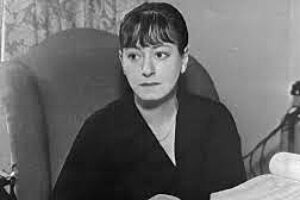Dorothy Parker, the Jazz-Age high priestess of the bon mot, is scarcely thought of as a political activist. Yet so many of her political beliefs resonate in today’s tumultuous world. In her Broadway plays, politics was never a theme, despite the fact that her first Broadway effort, Close Harmony, was written in collaboration with Elmer Rice, author of the expressionist play, The Adding Machine. Neither is the political ever overt in her poetry and short stories. Yet, Mrs. Parker was definitely a political being, so much so that she damaged her career with her beliefs and associations.
Anarchists in Boston
A major catalyst for her radicalism was the trial of two Italian immigrants. Nicola Sacco, a shoemaker, and Bartolomeo Vanzetti, a fish peddler, were anarchists sentenced to death for the purported murder in 1920 of two men carrying payroll boxes from the shoe factory. Though both men had solid alibis, they were convicted. During the several years of appeals, the case became an international cause célèbre because it was deemed a miscarriage of justice, prejudiced by anti-immigrant and anti-anarchist sentiment. The judge in the case was overheard saying, “I’m going to get those anarchist bastards good and proper.”

Bartolomeo Vanzetti and Nicola Sacco
In 1927, Dorothy Parker went to Boston to join marchers, which included John Dos Passos, on behalf of Sacco and Vanzetti. The crowd began chanting at her, “Guinea lover,” “New York nut,” and “Red scum.”
She was warned that she would be arrested if she didn’t go away in seven minutes. “I don’t mind being arrested,” she said as two policemen grabbed her. What she did mind was getting into the paddy wagon. The police roughly grabbed her arms as she insisted on walking to the station. The angry crowd followed, shouting at her, “Give her six months,” “Hang her!” “Kill her!”

Dorothy Parker and John Dos Passos marching on behalf of Sacco and Vanzetti in Boston.
When she was released, she quipped with reporters, “I thought prisoners who were set free got five dollars and suit of clothes.” She raised her sleeves to show them the bruises on her arms, complaining that they didn’t bother to fingerprint her, “but they left me a few of theirs. The big stiffs!”
Despite weeks of protests and a series of reprieves, Sacco and Vanzetti were executed in the electric chair, just after midnight on August 23, 1927. As a result, Dorothy declared, “My heart and soul are with the cause of socialism.”
A Child’s Awakening
Although she didn’t become a political animal until Sacco and Vanzetti, there were awakenings to the horrors of injustice even in her childhood. One day her aunt remarked how fortunate it was that there had been a blizzard so men had work shoveling snow. “And I knew then it was not so nice that men could work for their lives only in desperate weather, that there was no work for them when it was fair.”
Throughout her life, Dorothy nurtured a sense of shame over her father, Jacob Henry Rothschild—“No, no, no, dears, not those Rothschild’s. Father ran a sweatshop in the garment business.” (Parker was her married name.) J. Henry was a successful manufacturer of ready-to-wear cloaks, employing hundreds of Jewish immigrants from Eastern Europe.
The Red Scare
Like many in the 1930s, Dorothy flirted with Communism, believing it to be the great movement of her era. She was a founder of the Hollywood Anti-Nazi League and was beside herself with anger at those who did not take the rise of fascism seriously. “Which is worse the perpetrators of injustice of those who are blind to it?” she demanded to know.
She was also a supporter of the recently formed Screen Writers’ Guild. Writers who thought of themselves as artists and disdained the Guild were on the receiving end of her barbed tongue. “Now look, baby, ‘union’ is spelled with five letters. It’s not a four-letter word.”
While she visited Valencia, the Spanish Civil War was raging, and the fascists raided the city four times. She wrote passionately about the experience in the magazine New Masses:
If you are going to be in an air raid, it’s better for you if it happens at night. Then it’s unreal, like a ballet with the scurrying figures and the great white shafts of the searchlights. But when a raid comes in the daytime, you see little children wild with terror. They don’t cry. Only you see their eyes. I can still see those eyes. After one raid, I saw a great pile of rubble, and on the top of it a broken doll and a dead kitten—ruthless enemies to the fascists.
Dorothy gave a blistering speech in New York on behalf of the writers, directors, and actors who refused to cooperate the House Un-American Activities Committee (HUAC). She warned, “For heaven’s sake, children, Fascism isn’t coming—it’s here. It’s dreadful. Stop it.”
Despite her resistance, columnist Walter Winchell fingered Dorothy in the 1950s to the FBI. He submitted a fund-raising letter Dorothy had signed on behalf of the Spanish Children’s Milk Fund, which was considered a Communist arm. J. Edgar Hoover, whom Dorothy referred to as “the one who chases men for business and pleasure,” sent two agents to her house. Her dog kept jumping all over them.
When one of them asked her, “Have you ever conspired to overthrow the United States government?” “Listen, I can’t even get my dog to stay down. Do I look like someone who could overthrow the government?” Nevertheless, she was blacklisted in Hollywood for much of the rest of her career.

Lillian Hellman and Dorothy Parker
Although Dorothy was never subpoenaed by the HUAC, she did travel by train to Washington in support of her friend, Lillian Hellman, who was subpoenaed. In a letter to the committee, Hellman wrote, “I cannot and will not cut my conscience to fit this year’s fashions, even though I long ago came to the conclusion that I was not a political person and could have no comfortable place in any political group.” She refused to betray her friends and was one of the very few to escape prison after doing so, though, like Dorothy, she was blacklisted.
The NAACP Connection
I first learned about Mrs. Parker’s hatred of racism when I needed to obtain the rights to her poetry, which I was setting to music for my one-person musical play, You Might as Well Live. To my surprise, I discovered that the rights were owned by the NAACP. Now how could that be, I thought? What I learned was that Dorothy left her entire estate to Martin Luther King and in the event of his death, the rights were to be transferred to the NAACP. Dorothy died in 1967 and King, of course, was assassinated in 1968.
King, who never met Mrs. Parker, was surprised by the bequeathment. He learned about it by telephone while in a restaurant and exclaimed, “which verifies what I have always said, that the Lord will provide.” He went on to say that “this fine deed” would undoubtedly enhance her already stellar reputation.
In 1959, Dorothy, along with Truman Capote and Norman Mailer, was a guest on the David Susskind television show, Open End. When Susskind asked what most troubled her about America, she unhesitantly enumerated: injustice, intolerance, stupidity, and segregation—particularly segregation.
The woman who has been known as one of America’s greatest wits—and unfortunately for so many, nothing more than that—was, in fact, also a great defender of and advocate for a just society.
NOTE: I am obligated to cite Marion Meade and her authoritatively comprehensive biography, Dorothy Parker: What Fresh Hell Is This? for much of the material in this article and in my musical , You Might as Well Live.
The full story of the development of my musical, You Might as Well Live, appears in my autobiography, The Wrong Side of the Room: A Life in Music Theater, which can be purchased on Amazon. Anyone interested in seeing the script for You Might as Well Live (which incidently does not deal solely with Mrs. Parker’s politics, but also with her writings and her life) can email me for a PDF: info@normanmathewsauthor.com
A more amusing story about Mrs. Parker, taken from my play, can be seen by clicking here.




